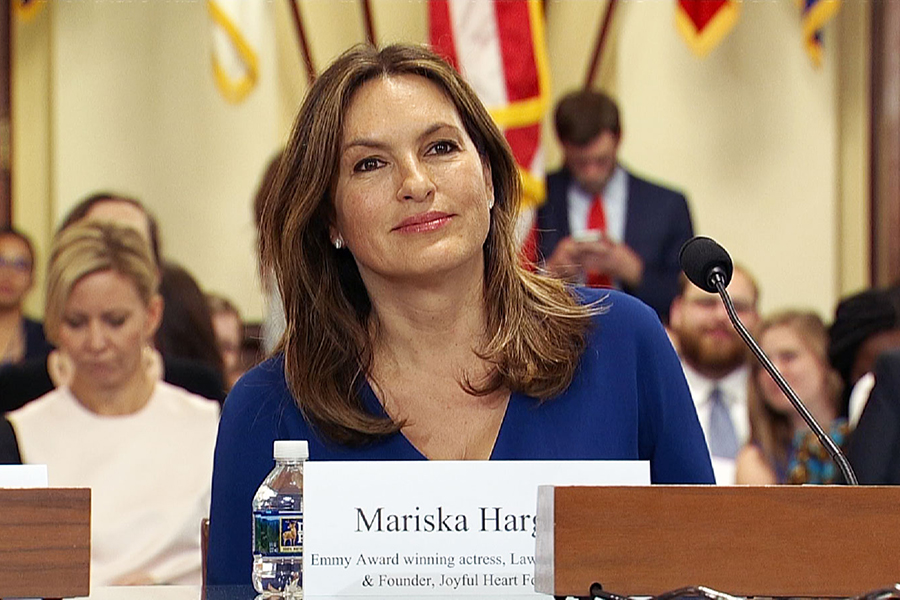NBC announced it is renewing “Law & Order: Special Victims Unit” for a record-setting 21st season. Mariska Hargitay will return as lead detective, Lt. Olivia Benson — and will become the longest-running female character in a live-action primetime series.
Hargitay has earned eight Emmy nominations for her role, winning the award for lead actress in a drama in 2006. In addition to starring on the series, Hargitay is also executive producer and a director.
It’s no surprise the announcement was made as March ended and April approached: March was Women’s History Month and April is Sexual Assault Awareness Month. “SVU” has been addressing issues of sexual assault every week for 20 years and its star is making women’s history.
“As ‘SVU’ moves into its third decade, Mariska has become an iconic figure as a star, advocate and crusader for women” said Franchise creator Dick Wolf. “She is an enduring champion of the movement to end sexual violence, and dozens of episodes have dealt with the very same issues that have shifted into the spotlight in this country in the past few years.”
“SVU” premiered in September 1999. With 454 episodes to date, season 21 is not yet slated to be the show’s last. Hargitay said if the writing remains strong, she plans to stay.
Her character is unique in television as a never-married 55-year-old woman in a lead role. Though she’s had a few relationships with men throughout the series, Olivia has remained relatively unattached. Her most intimate connection is with a child she adopted several years ago whose mother was killed while Olivia was covering her case.
She is never depicted as missing a love interest or broken for her failure to marry a man and raise biological children. Most unique is that her character defies many of society’s gender stereotypes. Olivia remains one of the most loved female leads on television — the lesbian community being no exception.

If you Google “Lesbians love Olivia Benson,” page after page of entries emerge from magazines as diverse as Philadelphia Magazine, Jezebel, Autostraddle and The Advocate. If you take an utterly random and totally unscientific poll on Twitter or among your friends, Olivia Benson is the detective most would like to see in a lesbian storyline. And if you read fan fiction, you will find a plethora of storylines centering on a lesbian Detective Benson.
Then there is popular culture’s appreciation. Taylor Swift named one of her cats Olivia Benson.
But what sets her apart is the impact her character has had on conversations surrounding sexual assault. She has brought awareness to demographics that may not otherwise engage with the nuances of sexual assault, sex crimes and survivors.
Olivia Benson even impacted the actress who plays her.
“I started getting fan mail from survivors who felt a connection to Olivia,” Hargitay said. “In many of these letters, people would disclose their personal stories of abuse — some for the very first time. I remember getting the sense that many were living in isolation with so much shame, but the shame belonged to the perpetrators. I wanted to help find a way to help people reclaim their lives and live them with a renewed sense of possibility and hope.”
Hargitay founded the Joyful Heart Foundation in 2004 to provide support to survivors of sexual assault and abuse as well as domestic violence and child abuse.
Hargitay has described the foundation’s mission as one of healing. The organization has raised more than $150 million and provides a range of services.
Joyful Heart’s advocacy work also includes the “End the Backlog” campaign, with a goal of eliminating the backlog of more than 250,000 untested rape kits sitting in storage facilities across the country to “open up a path to healing and justice for survivors.”
To tell the story of this backlog, Hargitay produced the documentary film “I Am Evidence” for HBO. The film debuted during Sexual Assault Awareness Month in 2018 and details how often the rapes of women who aren’t white, straight and middle-class are ignored. In Los Angeles alone, 86 percent of rapes aren’t prosecuted.
The film focuses on telling the stories of women who weren’t deemed worthy of an investigation, as well as the real-life detectives and activists trying to change the system. It debuted at several film festivals and is available for streaming on HBO and for community outreach presentations.
At the beginning of “I Am Evidence,” Hargitay states: “Victims have the courage to come forward and then nothing is done about it. What are we saying? We’re saying you don’t matter.”
Victims matter to Hargitay, just as they do to the fictional Olivia Benson. For Hargitay, sexual-assault issues are now her life’s work and “SVU” is the reason.
“I’m deeply proud to be a part of this groundbreaking show, and humbled to make television history,” she said. “The longevity and continued success of ‘SVU’ is a testament not only to the show’s powerful storytelling and ability to connect with viewers, but to its necessity. We have told important stories for 20 years, and we will continue to tell them.”
